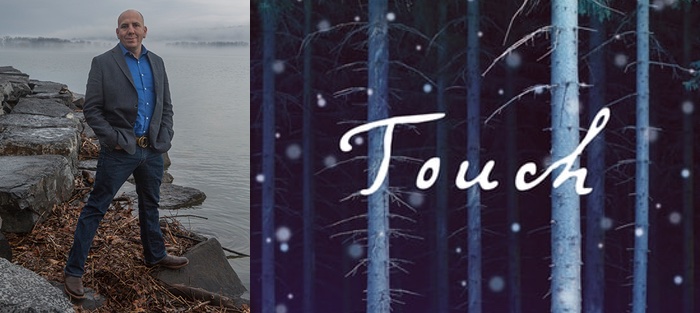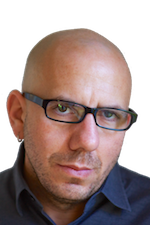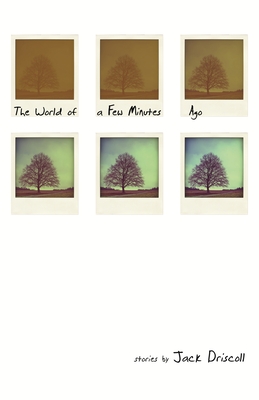Editor’s Note: For the first several months of 2022, we’ll be celebrating some of our favorite work from the last fourteen years in a series of “From the Archives” posts.
In today’s feature, Jackie Reitzes talks with Alexi Zentner about his writing routine, his influences, and how his novel Touch grew out of a short story. This interview was originally published on April 24, 2012.
The day I met Alexi Zentner he was wearing a t-shirt that read: I ♥ Hot Moms. Both fiction MFAs at Cornell, we shared workshop—and Aaron Sorkinesque banter—for three years in Ithaca. While there, he spearheaded and launched a student-taught craft class and showed a tireless commitment to the literary community.
Since finishing the MFA, he’s been busy. The paperback of Zentner’s debut novel, Touch, just came out. His next novel, The Lobster Kings, will be out in 2013. Touch was shortlisted for The 2011 Governor General’s Literary Award, The Center for Fiction’s 2011 Flahery-Dunnan First Novel Prize, and the 2011 Amazon.ca First Novel Award.
His fiction has appeared or is forthcoming in The Atlantic Monthly, Narrative Magazine, Tin House, Glimmer Train, The Walrus, and many other publications. He is the winner of both the O. Henry Prize (jury favorite) and the Narrative Prize, and has been shortlisted for Best American and the Pushcart Prize. Alexi has taught creative writing at Cornell University, and held teaching fellowships at Bread Loaf and Wesleyan University. Born and raised in Kitchener, Ontario, he now lives in Ithaca with his wife and two daughters.
We recently caught up over the phone about fiction, food, jogging, guilty musical pleasures, and (blame) Canada’s influential writers who inspired him to take up the pen.
Interview:
Jackie Reitzes: It’s almost short story month. Where did the idea for your story “Touch” originate, and what was the writing like?
Alexi Zentner: When I started “Touch,” I’d only been writing seriously for about a month, and I had an image stuck in my head of a girl trapped under the ice. I had always played at the idea of being a writer, which is different than actually writing. At the time my kids were really young—one and three. That image was really haunting—having someone you love so close to you and being unable to do anything to save them. I knew from the get-go I had something big and it could be something bigger. But I didn’t want to write Touch as a novel before I was ready for fear I would ruin it. Revision is incredibly important, but I also think that in that genesis of a story or a novel, you weave a certain DNA into it, and I was worried that in writing a novel too early in my writing career, with my abilities still unformed, that I would ruin what I had.
 How did you transform “Touch” from story to novel?
How did you transform “Touch” from story to novel?
The thing that’s really difficult is: a story is a finished thing. What you’re trying to do is figure out how to break it open, and how to distill it into its elements so you can make something else. Early on, I tried to just plug it in whole. I had this story, and I didn’t want to change it because I was so in love with the shape of it. But the shape of a short story is not the same as the shape of a novel. The novel came alive when I was really able to use the story as a springboard as opposed to a finished thing I was working toward.
With a perfect or near-perfect first chapter, you must wonder: where do I go next?
Right. In one of the first conceptions of the novel, the story “Touch” was what I worked up to. It was the end of the novel; but I think what’s really interesting in fiction is the way people recover from things, not what leads up to the incident. Because the issue is what happens after. If your entire novel is the prologue, that’s problematic.
Touch, all your writing really, shows an impressive depth of research. For example, one passage describes a blueberry “stomp”—as it would have been called at the time—and not a blueberry “patch.” You’ve included actual recipes from Bon Appetit in a story. How do you incorporate research so it feels organic?
This question shows my obsession with food. The story you mention with the recipes is a story about a wife and a mistress who are friends, but the obsession is actually with the food and not the sex. The thing with research is to do as little as possible. The glib answer is: I write fiction, so I make shit up. But I do research, too. I went to the library and pulled back issues of Bon Appetit and used those as signposts. It’s important to get the small details right so the larger world stays whole.
But spending hours researching the vernacular or dates of technological innovations can interrupt the writing process. Does that distract from your fiction?
Absolutely, and I’m pretty careful about that. Most of what I write comes whole cloth. I don’t tend to set things in real towns, which gives you a sort of freedom. If you imagine a town, and it’s a town you created, you don’t have to worry about whether it’s a stop sign or a stop light at an intersection. I’ll often take a town that I’ve seen and then create my own fictionalized version of it, so that I have the freedom to makes the facts as I want them. But I think certain facts are important. If you’re writing about a logging town in the 1870s and you write about the long stick with the hook on it that the loggers used, you can’t call it “the long stick with the hook on it.”
I’m glad you brought up the cuts, because if I didn’t know better, I would assume you grew up logging. Did you read up a lot on that sort of thing?
Growing up in Canada, logging towns have some of the same mythic quality to them as the American cowboy, and there’s a certain amount of osmosis. We forget that in fiction the facts are not as important as the feeling of it being true. When I do a lot research, I end up writing a book report. And there are a lot of authors who get caught in the trap of, Well I’ve done this research. I have to use it. But I think that as a writer it’s important to give yourself the authority to say, This is the way it is.
Does what you’re writing influence what you’re reading, or the other way around?
I deliberately don’t read work similar to what I’m working on because, if I do, I will find myself writing in that voice. There have been a couple books that Touch has been compared to that I’ve read since, but I resisted reading them earlier because I wanted to create something new and different that was mine. I believe in influence. I read widely. Any writer who tells you they don’t read is either lying or not very good.
You listen to music when you write, right?
For years, I used to listen to the same band over and over again as white noise. It’s kind of embarrassing.
Tell me!
Okay, it’s Counting Crows.
[Groans]
Over and over again. I couldn’t listen to music that I liked because it distracted me. Recently, for The Lobster Kings, one of the main characters has a Johnny Cash tape stuck in the cassette player in his truck, so I listened to Johnny Cash.
You can trick yourself with music into writing a slightly different way.
Absolutely. One question I get a lot is something I call “The Magic Pen Question.” What I mean by that is a variant of What type of pen do you use?
And can I have it?
Exactly: If I have that pen then I can write a novel. Everybody’s writing process is different, but I’m a big believer that you write a novel one word at a time. You get your ass in a chair, and you work. You work everyday. You privilege writing a novel over other things in life. But the things that I do—they’re patterns, they’re rituals, and music is one of them. Having the same music signals to me, Oh this is writing.
Writing day after day, week after week—ass in the chair—do you ever hit a roadblock?
I usually know the beginning, one or two things about the middle, and the end. So it’s like driving from New York to Los Angeles knowing you’re going to stop in Chicago and Denver, but you don’t have a map. When I get stuck, I go back, read through what I have, revise. And I know that I write better when I exercise. Part of that is because I hate running so much that I can’t think about writing, so it forces my brain to shut off, and that’s usually when whatever the solution is comes to me.
Sometimes you can’t focus. I used to be more brutal on myself. Now, if I’m having a bad day, I give myself permission to go see a matinee, or I’ll watch a TV show for an hour. It’s important to be generous and forgive yourself when you have a bad day. The worst thing you can do is insist that everything you write be perfect, because it just doesn’t work like that.
In revision, you need to be a little more disciplined about saying: this can be better. In a first draft, there’s something so important about getting a draft down, and then fixing it. The problem is when you read a novel and think This is what a novel should be. And even if you intellectually know that a writer worked and worked and worked on it, when you’re sitting at home, it’s harder to actually feel that what you’re doing is going to someday be this finished piece.
In a revision stage or in a first draft stage, what is your craft answer for achieving beautiful sentences?
Growing up, I read like crazy. I read two books a day. I still read a ton. It’s like a baseball player taking a swing. When you’re taking batting practice, you think: where do I put my foot, my hand, the bat. But when you’re in the box facing a pitcher, you need to just be able to swing. When I’m writing, it’s the same intuition, and when that’s not the case, it’s like there’s a light shining on that particular word saying that it’s wrong, and I know what it should be.
Has teaching changed the way you write?
Teaching makes you say out loud the things you don’t articulate to yourself. Even as a grad student, the most important thing about workshop was not having my work looked at, but talking about other people’s work. It was important for me to articulate my aesthetic. I love teaching. I could talk about writing all day, every day. I get so much energy out of it. You learn new things, because for me as a teacher, I try to treat every student differently. The dream for most writers is to write full time, and for me, now that I have that, I actually wish I was teaching, too.
You mentioned reading two books a day as a teenager. Which writers made you want to write?
There were three writers I read as a teenager where I thought—Oh, okay, I get literary fiction—where the language was beautiful and the stories still interesting and exciting: Margaret Atwood, Alice Munro, and Michael Ondaatje.
All Canadians…
Which is funny, because I didn’t think of it like that. They’re all Canadians, but they’re also all international. Their reach has certainly exceeded the scope of the country. Those writers opened up the world of literary fiction. Also, typical for a young nerdy boy, I read a lot of science fiction. Because I read widely, I learned the importance of plot and pacing, which is not always one of the strengths of literary fiction.
Writers forget that people read our work. And I like great sentences, but they have to be there for a reason, and everything should be subordinate to the work. It’s hard because we’ve all had sentences or paragraphs or chapters where we thought, I am God’s gift to writing, but they don’t fit the story, and they really should go. We don’t want to get rid of them because we’re thinking about how wonderful we are.
Did your relationship to your novel change after it published? Did it change you as a writer?
When you’re writing a novel, your characters don’t tell you what to do or make you do anything. If your characters make you do stuff, it’s because you’re being lazy as a writer. My characters cross the street because I make them cross the street, and if I don’t want them to cross the street, I’ll rewrite it so they don’t. As an artist you should be in complete control of the world you create.
The problem is, at some point that book goes out in the world, and there are things you can’t control. I try really hard when I’m writing to have it only be about the writing.
Touch flirts with fantasy—mythical realism, it’s been called. I believe your current project, another novel, is genre. How does writing literary and genre fiction differ?
The book I’m working on now is straight genre. It’s fun and, I think, smart and literary, but it probably falls into literary fiction in the same way that Justin Cronin’s The Passage might. I had just finished The Lobster Kings when I started writing this, and I wasn’t ready to embark on literary fiction. Literary fiction is a little bit like having a meal. You get to have dessert, but you also have vegetables and a balanced diet. And what I’m writing now is basically a giant bag of cotton candy.
Best advice you’ve ever been given about writing?
Start your next book the day after you finish your first one. The process of publication, no matter what happens, is disorienting. It’s important to remember that you want to write. And if you can get started on the next project, it gives you something that keeps you grounded and that you can return to.
What comes next?
The funny thing is my goals haven’t changed. They were always to essentially win a Nobel Prize [laughing]. And what I mean by that is, and you can hear me laughing, I’m not going to win a Nobel Prize, and I know that. But I want to write the kind of books that are read for generations, and, whether or not I can do that, what’s important is that I’m trying. Saul Bellow won the Nobel Prize and then famously said he was upset because he couldn’t win it again. Nobody’s ever written a perfect book. And I certainly won’t, so there’s never going to be a moment where I think, Oh, I’ve done it! Now, it’s on to pottery.
I’m kind of earnest about this, but I really do believe that art elevates humanity. I say that line a lot, because I think literature is inherently important. What we are doing as writers is important. It changes people’s lives. And the thing you try and do is write a book so that one person reads it and thinks, My God, I wish I’d come across this book earlier. Somebody said that reading teaches us to be alone, and I think that’s wrong. Reading teaches us so that we’re not alone.
Further Links and Resources
- Check out Fiction Writers Review’s review of Touch.
- Read Zentner’s beautiful and award-winning “Trapline” on the Narrative website.







